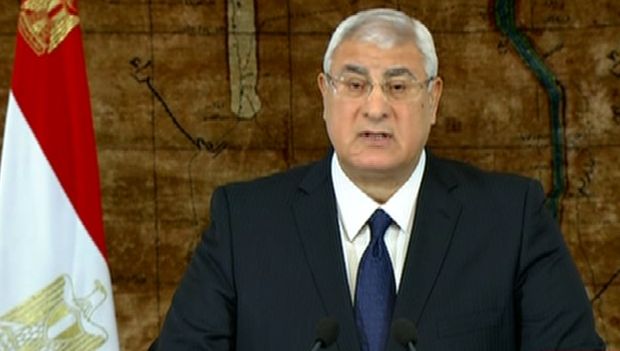
Egypt’s interim President Adly Mansour speaks at the presidential palace in Cairo, Egypt, on January 26, 2014. (AP Photo/Egyptian State Television)
Cairo, Asharq Al-Awsat—Egypt’s interim President Adly Mansour announced on Wednesday that presidential elections will take place before July 17 as Egypt’s presidential race heated up this week.
The news follows a reported assassination attempt against one prospective candidate, as well as widespread criticism of the presidential election law signed by Mansour earlier this week.
Mansour met with representatives of political parties on Wednesday to discuss presidential and parliamentary elections and the controversy that has surrounded the 60-article election law, and particularly around an article prohibiting appeals of election results that some have described as “unconstitutional.”
Speaking to Asharq Al-Awsat, chairman of the National Progressive Unionist Party, Sayed Abdel Aal, said: “The president listened to the remarks of all of the attendees, and his response was that the presidential elections law was issued in accordance with the provisions of the new constitution.”
According to Aal, Mansour confirmed that the new law “was sent to the General Assembly of the Supreme Court, which replied that it does not contradict the new constitution.”
“The president stressed to us that allowing appeals against the Higher Presidential Elections Commission decision could mean the suspension of the announcement of the name of the elected president for almost a year because of an appeal from one of the candidates,” Aal said.
Following the meeting, leader of the Conference Party Mohamed El-Oraby said that “the issuance of the election law in its current form is purely for patriotic motives,” adding that it is not meant to support any specific candidate.
The controversial law has prompted some politicians to boycott the election, which is expected to take place in May.
The only civilian to have expressed a desire to stand the presidential elections, Nasserite candidate Hamdeen Sabahi, demanded the amendment of the new law, which he said will threaten the next president’s legitimacy.
“Contradicting an article in the constitution less than two months after it was ratified is unacceptable,” he said.
“It is a worrying matter and stirs doubts regarding the transparency and seriousness of the electoral process,” Sabahi added.
In related news, former Egyptian Army Chief of Staff Sami Anan claimed to have escaped a dramatic assassination attempt earlier this week, although Egypt’s Interior Ministry later dismissed the claims. Anan, who has announced presidential ambitions, said he would reveal details of the plot at a later date.
Egypt’s powerful Defense Minister Abdel-Fattah El-Sisi is expected to announce a presidential bid soon, with most analysts saying that the army chief would win any popular vote. One of Sisi’s aides, speaking to Asharq Al-Awsat on the condition of anonymity, said that there is continuing uncertainty around the date Sisi will resign his post as defense minister to run for the presidency.
The source said Sisi would offer his resignation to President Adly Mansour following a meeting with the Supreme Council of the Armed Forces, in which Sisi will announce his resignation to the military council. The aide said Sisi would first offer his resignation to SCAF before offering it to the president.
